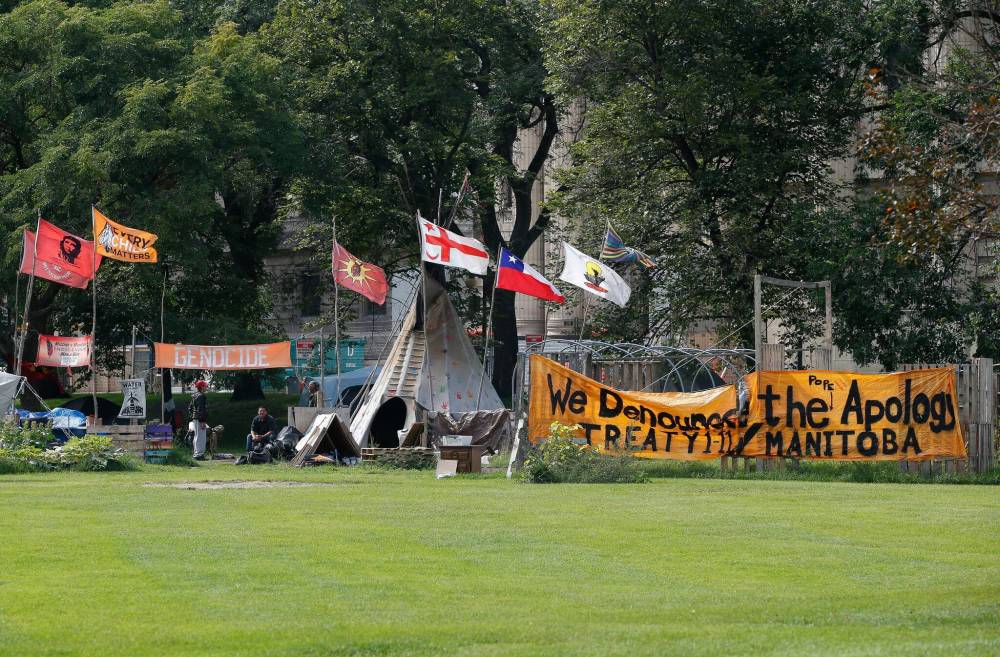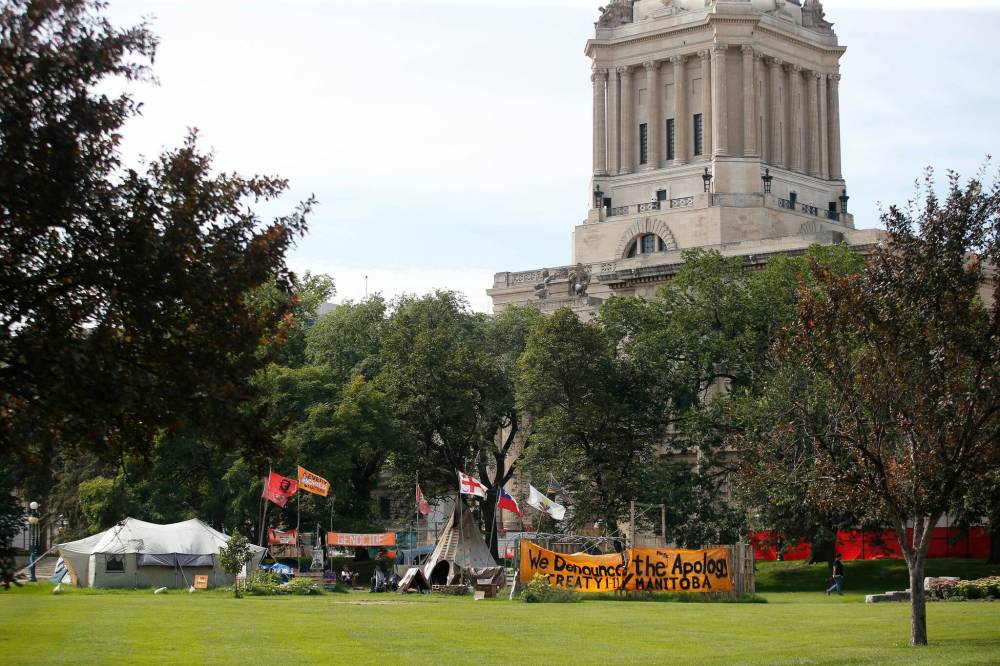New regulations, little movement on legislature grounds encampments
Advertisement
Read this article for free:
or
Already have an account? Log in here »
To continue reading, please subscribe:
Monthly Digital Subscription
$0 for the first 4 weeks*
- Enjoy unlimited reading on winnipegfreepress.com
- Read the E-Edition, our digital replica newspaper
- Access News Break, our award-winning app
- Play interactive puzzles
*No charge for 4 weeks then price increases to the regular rate of $19.00 plus GST every four weeks. Offer available to new and qualified returning subscribers only. Cancel any time.
Monthly Digital Subscription
$4.75/week*
- Enjoy unlimited reading on winnipegfreepress.com
- Read the E-Edition, our digital replica newspaper
- Access News Break, our award-winning app
- Play interactive puzzles
*Billed as $19 plus GST every four weeks. Cancel any time.
To continue reading, please subscribe:
Add Free Press access to your Brandon Sun subscription for only an additional
$1 for the first 4 weeks*
*Your next subscription payment will increase by $1.00 and you will be charged $16.99 plus GST for four weeks. After four weeks, your payment will increase to $23.99 plus GST every four weeks.
Read unlimited articles for free today:
or
Already have an account? Log in here »
Hey there, time traveller!
This article was published 30/08/2022 (1194 days ago), so information in it may no longer be current.
After an unsuccessful attempt to evict a pair of months-long occupations at the Manitoba legislature grounds, Justice Minister Kelvin Goertzen insisted new regulations prohibiting such encampments have teeth — as the Tories seek to avoid a major political misstep in clearing the protest groups.
“It’s certainly not the ability for officers to take the actions that they desire or that they deem to be appropriate at the time,” the province’s attorney general told reporters Tuesday, when asked why eviction orders issued by justice officials on Aug. 17 had not been enforced.
Members of two camps on the north and east lawns of the provincial seat of government were ordered to tear down a medley of tents, teepees and fires last week under the Legislative Security Amendment Act and its regulations, which came into force in July.
Both camps remained intact as of Tuesday.

The bill, which was introduced by Goertzen in March, following the so-called freedom convoy occupation of Memorial Boulevard, was intended as a tool to “better protect our democracy,” by giving security officers the authority to evict people from the precinct and issue fines to those breaking regulations.
Members of the justice department and the Winnipeg Police Service are in discussion with those at the encampments, but his office will not direct law enforcement on next steps, Goertzen said.
Safety and security concerns that prompted the regulations, however, have not gone away, the justice minister noted.
“It’s always been important, it was important to us before when there were instances earlier this year, to let those who are the professionals in this to make the determination of how it should proceed,” Goertzen said.
“They’re not just looking out at a narrow situation of safety at any given moment. They’re looking longer term, too, and what longer-term goals are in terms of ensuring that the grounds are safe. So I’ll leave it in their hands to do that.”
The Progressive Conservative government appears more interested in the appearance of maintaining law and order through the Legislative Security Amendment Act than in actually enforcing it, University of Winnipeg associate professor of political sciences Félix Mathieu said.
“It’s more of a symbol than anything else,” Mathieu said of the legislation. “They want to make sure that their supporters, their very partisan base, know that they are concerned, too, with these encampments. But at the same time, they don’t want to make it too easy for the opposition to attack them on this important issue, that is reconciliation with Indigenous people.”
The Assembly of Manitoba Chiefs previously called the government’s decision to issue eviction orders to occupants “patronizing and oppressive.”
The camp on the east lawn of the legislature formed in June 2021, following the announced discovery of potential unmarked graves at former residential school sites across the country. It maintains a sacred fire.
The removal of any peaceful camp “does not support reconciliation between the province and First Nations,” the AMC said.
The Tories need to preserve what progress they have made towards improved Indigenous relations and reconciliation, two major priorities for Premier Heather Stefanson, ahead of the next general election in 2023, Mathieu said.
“If there is any strong coercive action that is made by the government to have these camps banished from there, well it will bring more animosity, it will bring more Indigenous leaders and people of Indigenous communities to come by the legislative grounds to make sure they are heard — that they’re unsatisfied with the situation,” he said.

Paul Thomas, a professor emeritus of political studies at the University of Manitoba, described the current standoff on the legislature grounds as a sensitive situation weaving law, politics, and symbolism.
“The Stefanson government has been trying to establish more harmonious and constructive relationships with different components of the Indigenous community. A forced eviction of the occupants of the camp, especially if violence was involved, would be a serious setback to those efforts,” Thomas said.
Taking the time to find a peaceful resolution through negotiation is a prudent course of action so long as progress is being made, he added.
“To ensure that laws are applied evenhandedly, without favouritism, there must not be any actual or perceived interference by politicians in the decision making of law enforcement personnel or justice officials,” Thomas said.
“On the other hand, no group or individual should be free to flout the law without consequences.”
The two occupations must come to an end, Goertzen said.
“We have to recognize that there are concerns about safety and there has to be a resolution, but it is always the desire to have a peaceful resolution.”
danielle.dasilva@freepress.mb.ca

Our newsroom depends on a growing audience of readers to power our journalism. If you are not a paid reader, please consider becoming a subscriber.
Our newsroom depends on its audience of readers to power our journalism. Thank you for your support.
History
Updated on Tuesday, August 30, 2022 9:35 PM CDT: Corrects spelling of flout
Updated on Wednesday, August 31, 2022 9:37 AM CDT: Adds links








